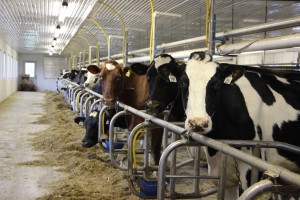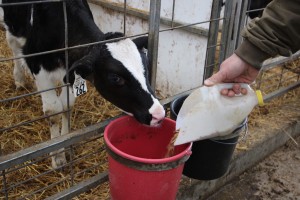
PLYMOUTH, Ohio — John Nolt shouldn’t have any trouble preparing the next generation for the farm life as his two small sons, Brandon, 3, and Randall, 1, have already taken to helping with the daily chores.
While Brandon pulls a feed cart down the alley, his brother Randall gets right to work, pushing up the silage with a plastic toy loader tractor. “When I’m feeding the cows, he has a mixer he wants to mix his feed with,” said Nolt, who added that his sons also like to pretend they are combining.

John Nolt has made a life for his family doing something he truly enjoys. Caring for the land and livestock that make up his approximately 150-acre grain and dairy operation in Plymouth, Ohio, has earned him a spot as a top soybean producer this past harvest season. “John is a very good producer,” said Chuck Gates, Seed Consultants, sales representative. “He has a very nice rotation system for crops.”
2015 season
Nolt raises soybeans, corn, alfalfa and wheat on his Huron County. This year his soybean crop yielded 77.23 bushels, placing him third in the Seed Consultants yield contest. The contest was open to all Seed Consultants customers — customers are located across the eastern Corn Belt from Illinois to Maryland and down to Kentucky and South Carolina. As a third place winner, Nolt received a $500 credit toward his next seed purchase.
Right now the fields lay blanketed in cover crops for the winter, and the cattle enjoy the fruits of Nolt’s labor. Aside from a small hay purchase and supplements over the summer, all the crops are raised to support the dairy herd, explained Nolt.

Background
Nolt’s parents moved to the area from Pennsylvania in the early ’70s and were one of the first families to start the Mennonite community in the area. Nolt grew up living the farm life. His family had a small hog operation and cash crop enterprise and his dad ran a tractor repair business on the family farm.
The youngest of nine siblings, Nolt spent some time helping out with his older brother’s dairy operation and decided he liked working with dairy cows. “I enjoy it. It’s a challenge,” said Nolt.
Making a dairy
He bought the farm from his father in March 2010 and began converting it into a dairy operation. The milking parlor has 52 tie stalls and a six milker system. Nolt said the family keeps around 50 head of milk cows and an equal amount of replacement heifers and calves.
Nolt’s herd of Holstein and Red and White Holstein cattle produce around 75-80 pounds of milk per cow, per day. His milk is shipped to Toft Dairy in Sandusky, Ohio, where it is bottled or made into ice cream.

Working the land
While Nolt said he enjoys the challenge of the dairy, his eyes really light up when he talks about his work on the land. “I call myself a biological farmer because I like to work with the soil and keep the soil healthy,” he said.
In fact, he likes working with the soil so much, he recently purchased an additional 67 acres that he said is in need of some work. Compaction has made the soil very hard, but Nolt hopes that some deep tillage and crop rotations will help restore the soil.
His summer projects included tiling his home farm with 2-inch tile and improving the surface drainage of his soil. “I had a couple sections of land that would not drain properly.”
While he said he has not noticed any immediate improvements in his crops yields, he said he has noticed that his enhancements to the land and soil over time have helped his per acreage bushels. Nolt has also seen the benefits in his dairy herd with a lower somatic cell count and fewer cases of Ketosis and milk fever.
To prepare his soil, Nolt used a compost, rich in phosphorus and other trace minerals and a combination of sulfur and boron. Nolt said his farming practices are conventional, having applied Roundup once during the season and some magnesium to help with yellowing leaves.
Currently, Nolt only has about six acres dedicated to pasture for his heifers to which he said he would like to incorporate more, but that is hard when the “cropland produces so good,” he said with a smile.
Diversification
This was the second summer the Nolt family has raised tomatoes in a small greenhouse located on the farm. They raised around 400 tomato plants this summer and packaged 60 100-pound boxes. (Last year they were able package 80 boxes.)
“We did pretty well with the crop this year,” said Nolt, noting the most difficult part of the job is packing and grading the tomatoes for market. The Nolts marketed their tomato crop at Blooming Grove Auction in Shiloh, Ohio.
Technology limits

Gates said being a Mennonite farmer can limit the amount and type of technology used on the farm, but that has not posed any challenges to Nolt’s operation. “We can have electricity. We really wouldn’t be limited unless computers or robotics were needed,” said Nolt.
“My farming practices do not include GPS,” he said. “I would be allowed to use a yield monitor,” which is something he noted he would like to incorporate in the future.
“John is a very progressive farmer. He looks to me as well as others for advice on what to purchase,” said Gates.









